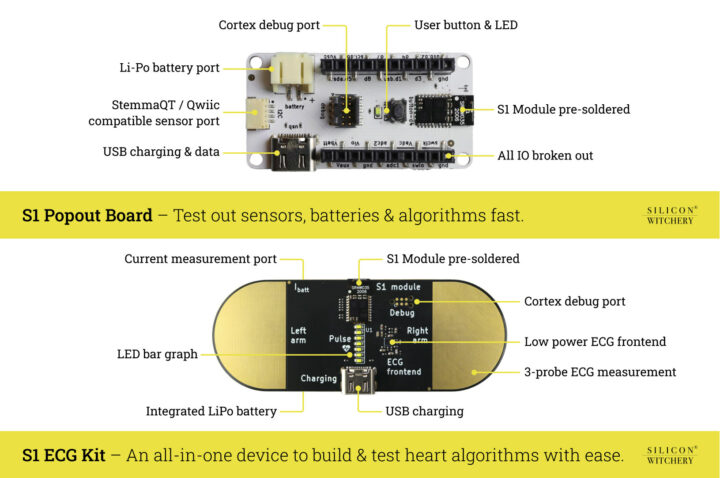Sweden-based Silicon Witchery S1 is a tiny module combining Nordic Semi nRF52811 Bluetooth LE SoC with Lattice Semi iCE40 FPGA designed for battery-powered applications leveraging DSP and machine learning (ML) at the edge.
The S1 module features just four key components in a tiny 11.5 x 6 mm form factor and targets applications requiring “demanding” algorithms while consuming as little energy as possible.
Silicon Witchery S1 module specifications:
- MCU – Nordic Semi nRF52811 Arm Cortex-M4 MCU @ 64 MHz with Bluetooth 5.2 support including Long Range, Thread support.
- FPGA – Lattice Semi iCE40 FPGA with 5k LUT and DSP blocks.
- Storage – 32 Mbit flash storage.
- Integrated antenna, passives, and crystals.
- I/Os – 20x castellated holes with
- 8x FPGA IO include I3C, I2C, SPI, and USB.
- 2x nRF GPIO pins with ADC and low power wake.
- SWD pins for debugging
- Power Supply
- Lithium battery charging and monitoring.
- 3x adjustable Vout rails including 1x buck-boost up to 5.5V
- Dimensions – 11.5 x 6 mm
The company provides a lightweight SDK based on the Nordic nRF5 SDK, and that relies on tools such as yosys, icestorm & NextPNR, as well as two open-source hardware development kits with the battery-powered S1 Popout board with Stemma/Qwicc QT connector for Adafruit and Sparkfun modules, and the S1 ECG kit with Analog AD8233 front-end designed to research ML-based ECG algorithms.
Use cases include high speed & time-critical DSP, pre-processing data on the edge, power-efficient algorithm design, parallel data processing, real-time AI inferencing, remote machine learning, Bespoke AI algorithm deployment, and Bespoke DSP algorithm deployment.
You’ll find documentation and instructions to get started with the module and the two development kits on the documentation website.
The nRF52811 + FPGA S1 module is sold for $30, the S1 Popout board for $39, and the S1 ECG Kit for $45 on Digikey. Additional information may be found on the company’s website.

Jean-Luc started CNX Software in 2010 as a part-time endeavor, before quitting his job as a software engineering manager, and starting to write daily news, and reviews full time later in 2011.
Support CNX Software! Donate via cryptocurrencies, become a Patron on Patreon, or purchase goods on Amazon or Aliexpress





